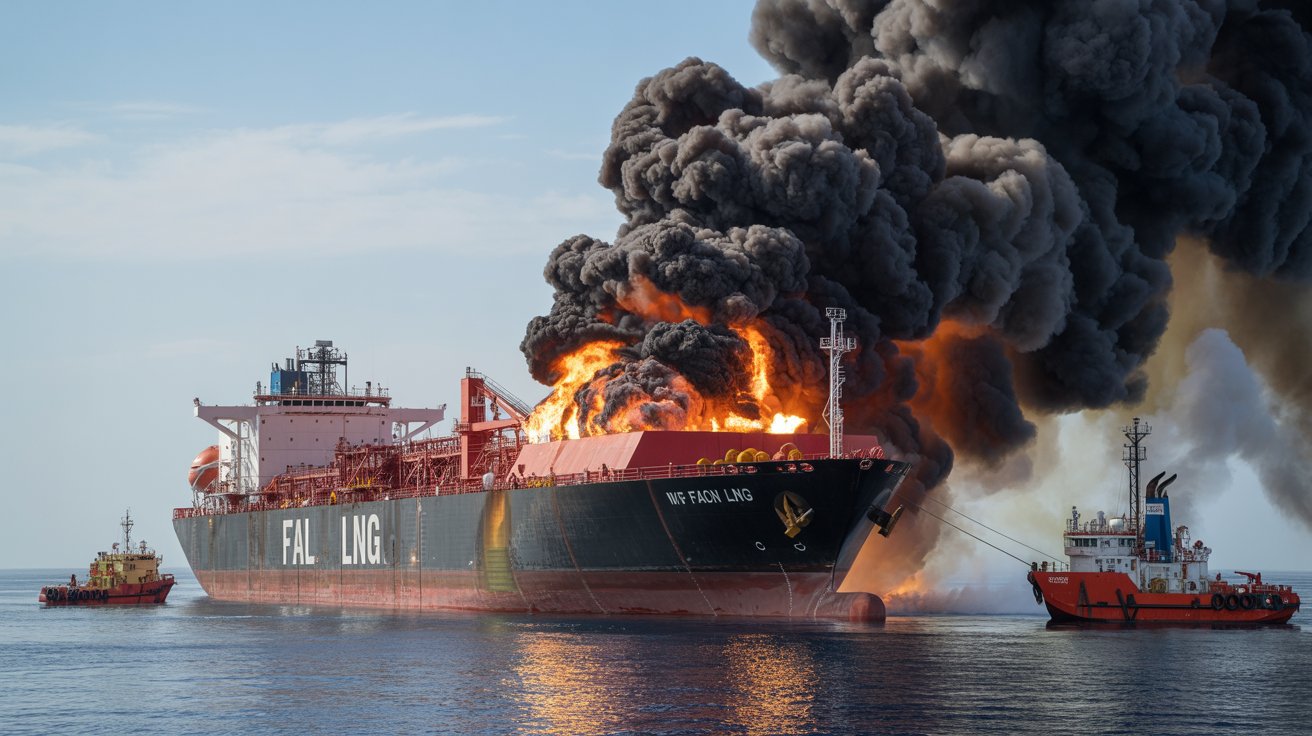Published on
October 19, 2025
On October 18, 2025, a Cameroon-flagged LNG tanker, the MV Falcon, was struck by an unknown projectile while navigating through the Gulf of Aden, roughly 60 nautical miles south of Yemen’s Ahwar. The explosion triggered a major fire onboard the vessel, which quickly spread across a portion of the ship. According to initial reports, around 15% of the tanker was engulfed in flames. The ship, which had departed from Sohar in Oman, was headed towards Djibouti when the incident occurred.
Explosion Causes Major Blaze
The explosion aboard the MV Falcon resulted in a large fire that required immediate attention from maritime safety authorities. The incident occurred in the Gulf of Aden, a region already known for tensions and attacks on commercial vessels in recent months. The explosion and subsequent fire on the LNG tanker raised serious concerns about the safety of international shipping in these high-risk waters.
The British Maritime Trade Operations (UKMTO) confirmed that the ship was struck by an unknown projectile, although the specific cause remains unclear. As of now, there has been no confirmed claim of responsibility for the attack, although it has raised suspicions due to the region’s ongoing instability.
Crew Rescue and Missing Persons
A swift and coordinated emergency response followed the explosion. The European Union’s naval task force, Aspides, immediately intervened in the crisis. Out of the 26 crew members aboard the MV Falcon, 24 were rescued and are in stable condition. However, two individuals remain unaccounted for, and rescue operations are ongoing. Authorities are doing everything in their power to locate the missing crew members, but the exact whereabouts of these individuals are yet to be determined.
The quick response of the crew in securing themselves and the swift arrival of rescue teams undoubtedly prevented further casualties. The vessel’s crew had to manage an intense and volatile situation while attempting to contain the fire, showing exceptional professionalism under difficult circumstances.
Investigations Into the Cause of the Explosion
As the fire continues to burn, the cause of the explosion aboard the MV Falcon remains unclear. Various maritime experts have speculated on the possibility of a missile or other projectile striking the ship, but the nature of the projectile and its origin are still under investigation.
The British maritime security firm Ambrey, in its assessment of the incident, stated that the LNG tanker was not part of the group of vessels that are usually targeted by Yemen’s Houthi rebels. This observation suggests that the attack may not be linked to the ongoing conflict in Yemen, but this remains to be verified by investigators.
In contrast, Houthi officials have denied any involvement in the incident. According to the Saba News Agency, a defense ministry official from the Houthi group clarified that they had no connection to the explosion or the fire. Despite this, the ongoing situation in Yemen, with its complex political dynamics, continues to make the Gulf of Aden and surrounding waters a hotspot for maritime insecurity.
Concerns Over Maritime Security in the Gulf of Aden
This incident highlights the continued risks faced by vessels transiting the Gulf of Aden, a major international shipping route. Over the past several months, the Gulf of Aden and the nearby Red Sea have witnessed multiple attacks on commercial vessels, many of which have been attributed to Houthi rebels. These incidents have not only disrupted shipping lanes but also raised concerns about the safety of global maritime trade in this vital region.
The increasing frequency of such attacks has drawn international attention to the need for enhanced maritime security measures. Efforts to safeguard commercial shipping have led to increased naval patrols and a heightened military presence in the area. However, incidents like the one involving the MV Falcon underscore the challenges of maintaining secure and safe passages for all vessels operating in the Gulf.
Environmental and Economic Impact
In addition to the immediate danger to the crew and vessel, the fire on the MV Falcon has raised concerns about potential environmental consequences. LNG tankers, given their cargo, pose significant environmental risks if damaged or breached. The burning of LNG could result in fuel spills, air pollution from smoke, and other environmental hazards. While experts are monitoring the situation closely, it is unclear how much the marine ecosystem could be impacted by the explosion and fire.
Economically, the disruption caused by such incidents can have far-reaching effects. Delays in shipments and increased security risks translate into higher insurance premiums and shipping costs. Given the global significance of the Gulf of Aden for trade, any prolonged disruption in the region could affect supply chains, leading to delays in essential goods being transported across the globe. This underscores the broader economic ramifications of maintaining safety and stability in international shipping routes.
Conclusion: The Need for Enhanced Maritime Security
The explosion and fire aboard the MV Falcon serve as a stark reminder of the vulnerabilities faced by commercial vessels operating in high-risk areas like the Gulf of Aden. While investigations continue to determine the cause of the explosion, the incident underscores the need for enhanced maritime security measures. With international trade passing through this region, it is crucial that further efforts are made to ensure the safety of vessels, crews, and the marine environment.
As rescue operations continue, the maritime community is waiting for more information on the final toll of the explosion and the cause of the fire. The incident also highlights the broader challenges posed by geopolitical instability and the constant threat of attacks on commercial shipping in vital trade routes. Given the increasing number of such attacks, international cooperation and robust maritime security protocols will be essential in safeguarding the flow of global trade in these dangerous waters.
